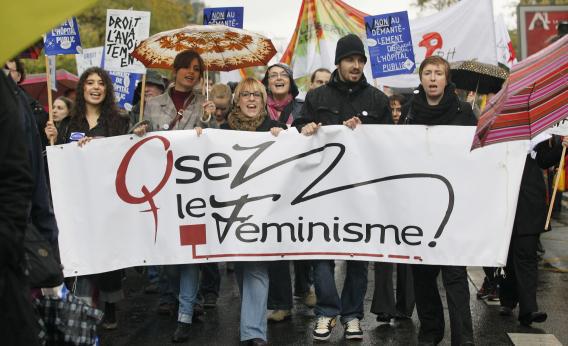On Thursday, Jezebel’s Lindy West explained feminism in a handy post entitled, “What No One Else Will Tell You About Feminism.” Actually, the post was reprinted from West’s soon-to-be-released book How to Be a Person, The Stranger’s Guide to College, which she co-authored with Dan Savage and some other nifty oracular types. I say oracular because these writers are both dispensing advice and peering into the future—at least, in West’s case, she’s penetrating some of the fog currently surrounding the word “feminism” so that a few years from now, maybe, we won’t need it anymore.
West runs through the history of feminism: its messy, overlapping first, second, and third waves as well as the post-feminist illusion that says sexism died sometime in the early aughts, so women should stop whining. Her main point is that whether they self-identify or not, most people walking around America today—hopefully book-buyers all—are feminists. That’s because not being a feminist requires you to believe that women are not people and do not deserve equal rights. And, as West spells out, “If you are not a feminist (or something blamelessly ignorant, like a baby or a ferret or a college freshman), then you are a bad person. Those are the only options. You either believe that women are people, or you don’t.”
In the world West envisions, we take it for granted that the average person is a feminist in the same way we expect him or her to be against animal cruelty, say, or the measles. Feminism becomes the default. Again, you are assumed to be a feminist until you demonstrate you are not by suggesting that women are not entitled to the same rights as men. So the burden of self-definition—of breaking free from the predominant cultural norm—rests on the anti-feminists. And that seems like a great development, because we normal, everyday feminists don’t want to have to worry about putting big “I’m a feminist” stickers on our chests when we could be going to work or reading a book or taking a walk. (To be clear, it’s the misogynists who should be making stickers. They deserve the paper-cuts and glue under their nails and permanent marker on their clothes too).
West finishes with a rousing proclamation:
“YOU are a feminist. You ARE a feminist. YOU ARE A FEMINIST. Welcome aboard!”
Ironically, the end point of West’s argument is a society in which we don’t need a special term to describe people who think human beings are born equal regardless of their Y-chromosome count. There is no word for “someone who opposes senseless violence against the elderly” or “someone who thinks ice cream is good.” That there needs to be a word for feminists is an unhappy product of our history. So as we adopt West’s definition of “feminism,” perhaps we can also start phasing out the term itself. Perhaps we can instead focus on labeling the outliers who are not feminists: the misogynists, chauvinists, and sexists. That would go a long way towards clarifying that feminism is now mainstream, obvious, and self-evident.
